Hollywood●0 min read●
The Hollywood Writers Strike: Will it End Anytime Soon?
Have you come across streaming? Well, if you haven’t, understand it happens to be the invasive species of the scripting industry – throttling all the competition and extremely harmful for the whole ecosystem when unregulated. And now, simply because of the changes to the whole entertainment environment because of streaming, both actors and writers are on strike!
On the 3rd of April, the Writers Guild of America (WGA) asked all its writers to vote on allowing a strike to happen. On the 17th of the same month, it was announced officially that 97.85% of its members had voted in agreement for a strike. When the deadline passed on the 1st of May for the new contract, the looming threat of the Hollywood writers strike was no longer a threat – it was a reality.
Only a little more than two months later, on 17th July, the Screen Actors Guild and American Federation of Television and Radio Artists (SAG-AFTRA) also went on strike, accompanied by a passionate speech by Fran Drescher, SAG president, to sound the alarm bells.
This is the first time in the history of Hollywood that both the SAG and WGA have been together on strike against AMPTP (Alliance of Motion Picture & Television Producers) since 1960 – it’s a historical anomaly.
It is certainly a little late to talk about the writer’s strike, but we feel it continues to be relevant, and it’s high time we talk about it. So, without wasting time, here we go!
Attention Fellow Writers: Welcome To The Hollywood Writers Strike!
Attention, fellow writers – the Hollywood Writer’s Strike is here! If you have found yourself asking Google about things like ‘writers strike Hollywood,’ then chances are you have heard about this historical strike that we are living with at the moment!
Since 2007, the WGA strike is the first strike to have taken place, cursing us with our now-indicted former president (no, please – it is really the reason behind The Apprentice staying on the air and demonstrating him as the Great American consciousness as a philanthropist and genius businessman.
The strike serves as a reminder that in spite of its function as an escape-oriented creative output for most people, the entertainment world, at the end of the day, is a business.
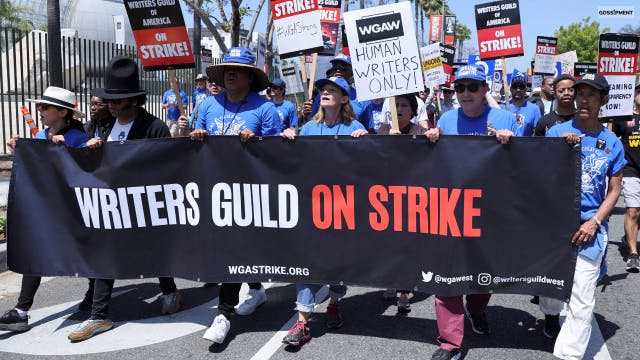
A writer for FX’s The Bear spoke to The New Yorker about his area of work right before the strike, “It’s a very regular-degular, working-class existence. And the only future I’m seeking financially is to enter that middle class, which has always been rarified for someone who comes from poverty … I thought we would be treated more like collaborators on a product. It’s like an assembly line now.”
While working on this particular show, his small apartment in Brooklyn had absolutely no heat, and the space heater simply blew fuses, forcing him to actually work from a public library. When the show actually won the Writers Guild of America for a comedy series, O’Keefe’s bank balance was negative, and he even purchased his tuxedo for the show on credit.
So, we are here with the latest Hollywood writers strike update – because when the 3rd installment of Deadpool stops filming, we need to figure out why!
So, Why Is Hollywood On Strike?
So, why are Hollywood writers going on strike? Let’s dive right in!
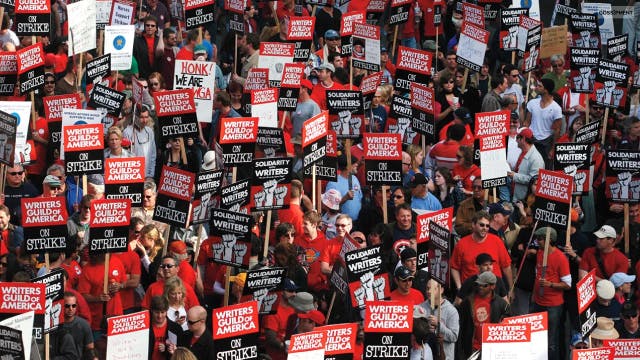
The Advent Of Streaming:
On 14th March, the Writers Guild of American released a detailed report with the title, ‘Writers Are Not Keeping Up.’ The report details how writers are not getting compensated as per what they deserve, blaming this phenomenon as a negative influence of the advent of streaming.
The report stated, “On TV staffs, more writers are working at a minimum regardless of experience, often for fewer weeks, or in mini-rooms, while showrunners are left without a writing staff to complete the season. And while series budgets have soared over the past decade, median writer-producer pay has fallen.”
The MBA Problems:
The report further points out an increase in the number of writers working for the Minimum Basic Agreement across a range of different roles – from show runners to staff writers.
■ 98% of staff writers work for the minimum MBA – a 12% increase from the 2013-2014 season.
■ 49% of show runners work for the minimum MBA – a 16% increase from the 2013-2014 season.
The issue here? The total percentage of television working for minimum MBA rose from just a third in the 2013 – 2014 season to almost half of all the writers in the 2021 – 2022 season.
The Pay Gap:
The advent of streaming or the MBA-oriented problems weren’t the only ones – there’s more! The report also pointed out that the comedy and related shows on steaming platforms have refused to acknowledge basic MBA protection – the bare minimum for weeklies and scripts for writers of this kind of content when they are working on any streaming show. But the episodic writers who work for the very same companies have those particular minimum standards.
In the case of feature-film girlies, the WGA further pointed out that when you attempt to adjust for inflation-related reasons, screen pay has actually gone down in the past five years by 14%!
What Can The Writers Even Do About It?
So these were the issues, and what could the writers even do about this – what are the Hollywood writers strike demands?
The Writers Guild of America demanded,
■ an increase in the minimum compensation in all relevant areas of media,
■ an increase in residuals,
■ an appropriate compensation for writing TV shows,
■ an increase in contribution to health and pension plans,
■ an increase in the efforts to strengthen the professional standards and
■ an increase in overall protection for all writers.
There are similarities between the demands of the writers and those of the actors, as laid out by the rejected contract of SAG. Both are currently fighting an increase in their MBA, with SAG demanding an 11% rise in the increased MBA in the first year, followed by a 4% rise in the next years.
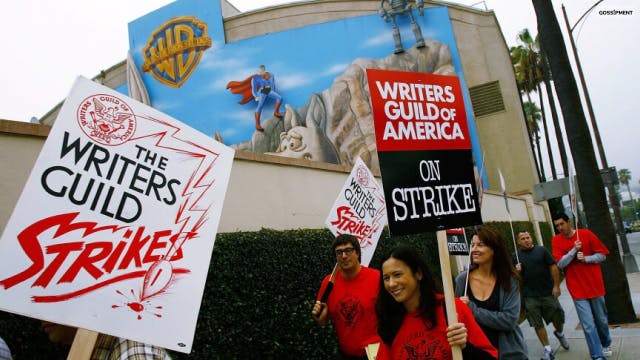
At the same time, the actors are also seeking an increase in residuals because of the normal impact of streaming on the primary source of income for actors. Kimiko Glenn, a writer on the Orange Is The New Black team, shared a video recently – the video featured a check for $27.30. This shows how an increase in residuals is imperative.
The only aspect of the SAG strike that is different from the WGA’s list of demands is the SAG’s opinions on enforcing rules related to self-tape auditions. Self-tape auditions are about actors filming at their own expense.
These audition tapes have become normal in the industry since the pandemic, but so many actors ended up paying massive amounts of money just to professionally tape their auditions with absolutely no guarantee of the audition getting them any job.
The AMPTP offered to give guidelines for shooting these self-tapes, but the same guidelines could also be unenforced, which technically means that the economic pressure can definitely persist.
When Did The WGA Strike Begin?
If you are asking, ‘Are writers still on strike?’ then you need to know that they are, and chances are it will go on for some time.
So, when did it all begin? Let’s find out!
Phase I:
Since February, a strike has been in the air, right after the L.A. Times came up with a report that both studios and writers are planning on a potential walkout. On 27th February, the WGA put up their ‘pattern of demands’ for a vote by the members.
This included,
■ standardized compensation for both streaming and feature films,
■ abuse of mini rooms in which writers are hardly given any time to write the shows and
■ commensurate compensation for dealing with the issues.
On 7th March, 98.4% of WGA members voted in favor of approving the different demands so that the same could be negotiated with the infamous AMPTP, as per reports by Variety.
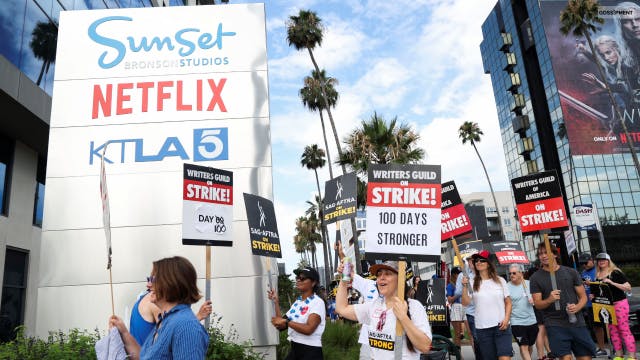
Phase II:
At the beginning of March, WGA’s chief negotiator, David Young, was replaced by Ellen Stutzman. Young did lead the WGA through the strike in the 2007-2008 season – while Matthew Belloni from Puck called Young ‘controversial’ during his departure, Belloni called him ‘feared’ and ‘fiery.’
Belloni further wrote at the time, “Nobody does anything in Hollywood unless they’re afraid. And he’s set a fear-based tone and cadence, if not the actual agenda, for these negotiations.”
On 17th March, only three days prior to negotiations, Blockers and Pitch Perfect writer Kay Cannon, on behalf of herself as well as the other WGA negotiators, uploaded a video about what could happen once the negotiation began.
Cannon mentioned, “There maybe rumors or leaks to the press about what is going on in that room. Take these with a grain of salt. They are likely coming from the studios and are intended to scare or distract you and to undermine our strength at the table.”
Phase III:
After the Hollywood Writers Strike was announced officially, both sides put out some documents talking about how negotiations could go on the two sides of the discussion.
The WGA has mentioned several times that the AMPTM simply ‘rejected’ their demand outright – this included issues such as weekly pay for all feature writers, on streaming residual based on viewership, and AI on different MBA-covered projects.
Additionally, the WGA also reported that the AMPTP actually countered, but in spite of that, both sides failed to reach any compromise.
The problem? No agreement could be reached on the increase of weekly pay for story editors, staff writers, or executive story editors, and even on general minimums.
Meanwhile, the AMPTP did put out a document that countered why they could not have given in to the requests of the WGA.
The AMPTP’s reasoning included multiple arguments that the minimal staffing quotas are actually antithetical to the whole creative process, that the increase of general wage in the first year currently on the table happens to be the highest in the last 25 years, and that they are still in the middle of the discussion.
How Did The WGA Negotiations Go?
Negotiations between the AMPTP and the WGA started on 20th March. Ideally, the intent was to make the negotiations last for two weeks before going on a break for two weeks. On 31st March, the last day of negotiations, there was a proposal for the AMPTP and the WGA to talk during the scheduled break, as per reports on Deadline.
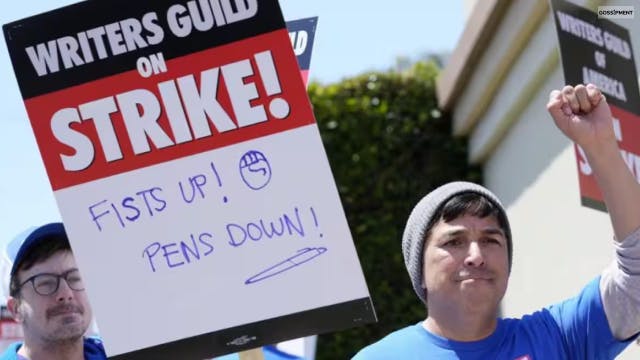
The publication called this a “significant step in the negotiations,” with sources even telling the outlet that “there seems to be a willingness to keep discussions going, in some form, after some common ground was found between the WGA and AMPTP.”
However, Puck disputed the positive version of the negotiations, even referring to it as nothing but a “smokescreen,” recalling Cannon’s earlier comments about the press. Jonathan Handel even wrote in Puck, “A well-informed and impartial source, albeit from outside the room, tells me that the report’s spin was ‘nonsense’ and the alleged movement is a ‘charade.’”
As per Puck, the negotiations were made up mostly of the two sides simply reading their speeches at each other instead of actually discussing matters. A source even said, “It truly seems like they just want to strike and have no intention of coming to a deal.”
On the 1st of May, negotiations concluded without any agreement, which led to a strike.
The Second Round Of WGA Negotiations:
The first good news that came out of the Hollywood Writers Strike arrived on 1st August when the president of AMPTP, Carole Lombardini, reached out to the negotiators of WGA for restarting negotiations.
The writers got the news in their mail, and the social media of WGA also shared the news. Lombardini had specifically requested the meeting on Friday, 4th August. On 11th August, the writers received a counteroffer, and on 22nd August, they went for another meeting with Lombardini, David Zaslav, Ted Sarandos, Donna Langley, and Bob Iger.
The WGa later described how, instead of any negotiations, they were “met with a lecture about how good their single and only counteroffer was.”
In the shared document of AMPTP, there were some notable points in terms of compromise, but at the same time, there is still reluctance on many demands of the WGA.
Minimums were increased, though not much. Plus, the AMPTP expressed willingness to give ten-week employment to writers and guarantee at least 2 mid-level writers for every show, though WGA has asked for 6 writers per show.
The most interesting offer was how the WGA would receive quarterly reports on the total hours watched – this was surprising considering the streaming platform’s unwillingness to share any kind of streaming-related data.
In the case of AI, the studios have limited their offer with the words, “Written material produced by GAI will not be considered literary material and that it would not affect the writers’ “compensation, credit, and separated rights.”
This indicates that the work of writers can still be used for training generative AI.
Apparently, only 20 minutes after the meeting ended, the counteroffer made by AMPTP was leaked to the media. The WGA called this move “the companies’ plan from the beginning — not to bargain, but to jam us. It is their only strategy — to bet that we will turn on each other.”
The SAG Negotiations:
Initially, SAG’s contract was up by the 1st of July, but discussions went on till the 12th of July. Then, on 13th July, after negotiations were no longer possible, SAG President Fran Drescher went on to announce the SAG strike with a thrilling speech, clearly showing why actors can make for frightening opponents in the press.
In her speech, Drescher said, “I cannot believe it, quite frankly, how far apart we are on so many things. How they plead poverty, that they’re losing money left and right while giving hundreds of millions of dollars to their CEOs. It is disgusting. Shame on them. They stand on the wrong side of history at this very moment.”
Additionally, she also shed some light on how negotiations were going on before the SAG strike. “I went in in earnest, thinking we would be able to avert a strike. In earnest, we gave them an extension of 12 days, which they absolutely wasted, making us feel like we’d been duped. Maybe it was just to let studios promote their summer movies for another 12 days. They stayed locked behind closed doors; they continued to cancel our meetings with them. We thought, Well, maybe they’re really getting into it, but then what we ultimately received from them was what my mom would call a lack and a schmeck.’”
What Is Everyone Saying About Strike Authorization?
Notable names from Hollywood have gone on X (formerly called Twitter) to express their support for the Hollywood writers strike as well as the actor’s strike.
Daniel Kwan wrote on X, “It’s about writers getting their fair share. It’s about maintaining a healthy middle/working class of writers in our industry. It’s about showing our collective strength as new tech threatens to take away our leverage.” This famous Oscar winner is not the only one voicing their support on social media.
Other writers of popular films and hit television shows like Bart Nickerson (Yellowjackets), Ashley Lyle (Yellowjackets), Jeffrey Lieber (Lost), Justin Halpern (Abbott Elementary & Harley Quinn), Ashley Nicole Black (A Black Lady Sketch Show & Ted Lasso), and Adele Lim (Crazy Rich Asians), and more have also expressed their support for the strikes.
The SAF-AFTRA members had supported the strike before it became such a big deal, and they weren’t alone. Famous celebrities like Brendan Fraser, Jennifer Lawrence, and Meryl Streep.
Over three hundred celebrities signed an official letter to the SAG leadership on the 28th of June, saying, “We hope you’ve heard the message from us: This is an unprecedented inflection point in our industry, and what might be considered a good deal in any other year is simply not enough.”
What Shows And Films Would Be Most Affected By The Strikes?
If you have been looking up the Hollywood writers strike 2023 update because you were worried about upcoming films and shows that would be affected the most, then you have come to the right place.
Because isn’t this what all of us were thinking all this while? Let’s dive right in!
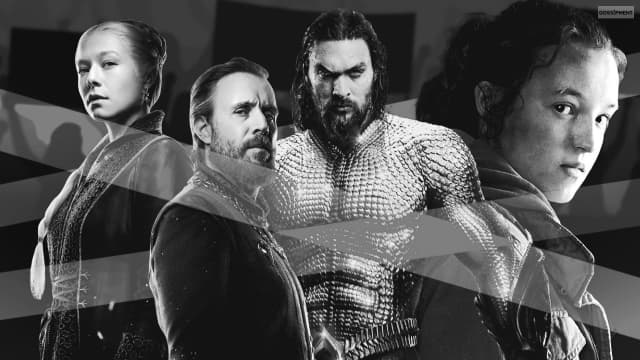
The Late-Night Shows:
When the Writers Guild of America went on strike, the late-night shows took the first hit! Saturday Night Live was the first show to receive the impact of writers going on strike, followed by other talk shows.
After that, while most of the popular shows on the different popular networks were on Summer break, you can expect them to get screwed once they come back during Fall since writers would typically write during the Summer months.
Abbott Elementary, you are definitely in some danger, girl! There have been other shows, as well as films, which have either been shutdown or paused by the two strikes.
Shows That Immediately Went Off Air:
● The Tonight Show Starring Jimmy Fallon
● Late Night With Seth Meyers
● The Late Show With Stephen Colbert
● Jimmy Kimmel Live!
● Last Week Tonight With John Oliver
● Real Time With Bill Maher
Streaming Platform Favorites:
Streaming is another whole story. Remember how we mentioned at the beginning that streaming has managed to cause plenty of changes in the entertainment industry?
Well, strikes like the Hollywood Writers Guild strike are not ideal for them, but streamers do have different shows banked for a long time now, so they will be able to tide their audiences over for at least a while.
For instance, HBO released The Sympathizer adaptation’s trailer on 12th April, but the show is not apparently coming out before 2024. The strikes can force streaming platforms to actually focus more on international shows or simply parcel out content they already have slowly.
Just like there is no precedent for how the concept of streaming changed television, there is no precedent for how the WGA strike will impact the streamers in the long run.
Shows That Were Paused Mid-Production:
■ Stranger Things,
■ Hacks,
■ Yellowjackets,
■ Cobra Kai,
■ The Last Of Us,
■ The Handmaid’s Tale,
■ Severance, and
■ Abbott Elementary.
The Films:
While the Hollywood Writers Strike has been going on, the actor’s strike has also been going on simultaneously. For the SAG, the absence of actors is being felt the most during promotion cycles and on red carpets – even for big Summer blockbusters.
That is why the London premiere for Oppenheimer was actually cut short and the reason why only Minnie and Mickey attended the premiere of Disney’s Haunted Mansion. Of course, Reality TV shows and other industries outside the WGA and SAG, like books, podcasts, and music, stay unaffected.
Interestingly, the big world of content creators and influencers has been influenced by the strike as well since some influencers happen to be a part of SAG.
There are certain projects, such as some A24 films, that have been granted permission, A.K.A. interim agreements. This means that SAG actors can work on projects that aren’t affiliated with AMPTP. However, from 14th August, SAG-AFTRA, in alliance with WGA, will no longer allow any kind of interim agreement with any projects covered by the WGA in the United States.
Films That Were During In Pre-Production And Production:
👉 Thunderbolts,
👉 Blade,
👉 Deadpool 3,
👉 Ghostbusters 4,
👉 Avatar 3,
👉 Avatar 4,
👉 Mufasa: The Lion King,
👉 The sequel to Tim Burton’s Beetlejuice,
👉 Musical Wicked’s film adaptation,
👉Gladiator 2,
👉 Juror #2,
👉 Mission: Impossible – Dead Reckoning Part Two, and
👉An untitled F1 drama.
And It’s A Wrap!
The Hollywood Writers Strike, as well as the Actors Strike, are currently going on in full force. The question is – when will the AMPTP reach an agreement with the WGA and SAG? And how will the agreement ultimately impact the entertainment industry, for better or worse? Feel free to share your thoughts, opinions, and ideas about the strikes in the comments below.
Recommended Reading:
■ Halston Sage: Biography, News, Movies and relationship
■ The Hottest Instagram Models You’d Want to Follow in 2023
■ Amber Heard Net Worth: Biography, Movies, And Annual Income
